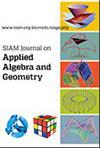线性结构方程模型中的多重分离
IF 1.6
2区 数学
Q2 MATHEMATICS, APPLIED
引用次数: 5
摘要
在观测数据因果发现理论的基础上,我们研究了具有非高斯误差项的线性结构方程模型中多个(组)随机变量之间的相互作用。给出了高阶累积量结构与因果图中组合结构的对应关系。以前已经证明,在图中,协方差矩阵的低秩对应于跋涉分离。将此准则推广到多个顶点集,我们刻画了高阶累积张量的子张量的行列式何时消失。这个标准也适用于存在隐藏变量的情况。例如,它允许我们识别k个观察变量的隐藏共同原因的存在。本文章由计算机程序翻译,如有差异,请以英文原文为准。
Multi-Trek Separation in Linear Structural Equation Models
Building on the theory of causal discovery from observational data, we study interactions between multiple (sets of) random variables in a linear structural equation model with non-Gaussian error terms. We give a correspondence between structure in the higher order cumulants and combinatorial structure in the causal graph. It has previously been shown that low rank of the covariance matrix corresponds to trek separation in the graph. Generalizing this criterion to multiple sets of vertices, we characterize when determinants of subtensors of the higher order cumulant tensors vanish. This criterion applies when hidden variables are present as well. For instance, it allows us to identify the presence of a hidden common cause of k of the observed variables.
求助全文
通过发布文献求助,成功后即可免费获取论文全文。
去求助
来源期刊

SIAM Journal on Applied Algebra and Geometry
MATHEMATICS, APPLIED-
CiteScore
2.20
自引率
0.00%
发文量
19
 求助内容:
求助内容: 应助结果提醒方式:
应助结果提醒方式:


